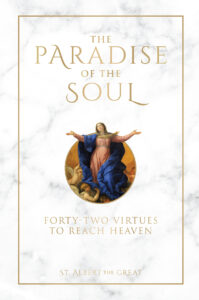True disdain for worldly matters is to be ready to renounce all material possessions, social prestige and rank, and ecclesiastical distinctions for the sake of God. It means being able to withdraw oneself from all fleshly attachments and all secular customs for the sake of the hope of eternal beatitude. Saint John exhorts us to this detachment in his epistle, saying, “Do not love this passing world, nor anything in this world.”
Saint Augustine acquired this detachment from earthly things when he came to find that no earthly thing could bring him satisfaction or fulfillment. And similarly, Saints Agnes, Catherine, and Cecilia, and other holy virgin-martyrs disdained this world and all its adornments for the sake of their love for Our Lord Jesus Christ.
We should be induced to feel a certain disdain for worldly things when we consider the inconstancy and unreliability that they exhibit towards all those who pursue them. The inconstancy of this world was even experienced by its Creator Himself. For when our Lord arrived in Jerusalem on Palm Sunday, He was greeted with great applause and acclamation, as the crowds exclaimed, “Hosanna to the Son of David! Blessed is He who comes in the name of the Lord; Hosanna in the highest!” But just a few days later, on the Friday of the same week, the same crowds cried out to Pilate, “Crucify Him! Crucify Him!” and, “If He were not a criminal, we would not have handed Him over to you.” And when He was dying on the cross, these crowds mocked and derided Him saying, “If You are the Son of God, save Yourself!” The same people who had applauded and venerated Him with palms and flowers now crowned His head with thorns, and struck Him with rods and whips. And the very same people who had cast their vestments on the ground before Him on Palm Sunday in adoration stripped Him of His garments in contempt on Good Friday. [Such, indeed, is the inconstancy of this passing world!]
A consideration of the grave perils that result from loving the things of this world ought to teach us to regard them with disdain. For the apostle James asks us, “Do you not realize that friendship with the world is enmity to God? For whoever wishes to be a friend of this world makes himself an enemy of God” For the world hated the Lord Jesus, as He Himself testified to the apostles: “If the world hates you, know that it hated Me before you.”
Signs of True and False Disdain for Worldly Things
A sign of true disdain for the things of this world is when a person will not be swayed either by the temptation of material pleasures or deterred by threats, nor will he be influenced by any human praise or vituperation. But a manifestation of false or insincere disdain for earthly things is when a person begins to renounce material pleasures only when poverty or old age compels him to do so. In such cases, he has not really left the world at all, but rather the world has left him. But—alas—how very many people there are who renounce sin only when they find themselves no longer capable of sinning!
A Prayer To God For Detachment From The World
This world is but a passing shadow,
And filled with empty toys,
Its pains don’t last forever,
And neither do its joys.
O Lord, let all my longings
Be fixed on things above.
Not on short-lived pleasures,
But everlasting love!
This article is taken from a chapter of The Paradise of the Soul by St. Albert the Great, which is available from TAN Books.









1 Comment
[…] A Pentecostal Discovers Liturgical Worship: Fr. Michael Rennier video – Coming Home Network Disdain for Worldly Things – St. Albert the Great via Tan·Direction Blog Saint Mother Teresa’s Humility List: 15 […]